First, an apology for missing the Friday note and for posting the Monday essay so late. It’s been a hellish couple of weeks. Thanks for your understanding. <3 Second: yes, this is indeed another reflection on Barbie, and a little bit on Oppenheimer, which, depending on your various feeds and media outlets of choice, you are likely drowning in. The good news is, you do not have to read this! The other good news is that, if you are like me, you are DELIGHTED for another reflection on Barbie (and a little bit on Oppenheimer). Because so much good stuff has already been written, I’m going to break this down into themes with my own thoughts and links to others’ thoughts. (These categories blend together so please view it as an organizing system for easeful reading rather than any statement as to what belongs where.) Also, it is full of spoilers. You’ve been warned!
Barbie & Feminist Politics
Is the feminism in Barbie basic and flawed? Absolutely Yes. Barbieland is a constitutional matriarchy and the happy ending assures us that this is a good solution to fighting the patriarchy. Because I am neither a misandrist nor a liberal, this is boring to me. Is Barbieland’s ultimately white feminism ignoring intersectional differences like race, class, and ability? Also yes. Sure we get Barbies of color, disabled Barbies, and fat Barbies, but they have the same status as Stereotypical Barbie (that’s Margot Robbie), so the diversity feels more like hollow tokenism than any analysis of how power operates. Greta Gerwig is willing to provide a critique of the patriarchy—including a line where a male character admits that it has to operate more subtly and insidiously today— without addressing how patriarchy impacts people in distinct ways based on other axes of oppression. Is Barbie (the doll and the movie) inherently capitalist and therefore an iteration of Girl Boss/neoliberal feminism. I mean, sure, yes, obviously? The script provides overt critiques of corporations and capitalism but with everyone’s awareness that the movie is also making buckets of money for Mattel and Warner Bros. Did the film make feminist consciousness-raising seem like a party trick, and miss an opportunity for a weightier engagement with notions of cultural messaging and agency? For sure! I’ll channel Michelle Tea’s sarcasm here: “Perhaps I should admire the folks ranting about how simpleminded it is – they still believe a toy corporation in league with a film corporation would give us more!”
To me, these things are still worth naming. As a person who has taught Critical Media Studies courses for many years, Barbie is dream pedagogical material. What better way to teach about the failure of representational politics, the shallowness of liberal feminism, the definition of hegemony? Hollywood will not make radical films because Hollywood is not radical. Barbie is not radical, but we get to talk about the shortcomings of its asserted politics, and to do so we get to watch Barbie! I do not turn to the movies for revolutionary guidance; I turn to the movies for pleasure (entirely valuable on its own) and, sometimes, the opportunity to engage in thought, collectively, on how we could dream bigger than the visions allowed on our screens.
Barbie & Beauty Culture
Okay. I want to take seriously critiques of Barbie for promoting unrealistic beauty expectations. There is no doubt that Barbie has contributed to the perpetuation of a white supremacist version of femininity (thin, white, blonde). More importantly, Mattel and the movie are responsible for pushing products that have devastating effects on workers, the environment, and potentially our collective self-esteem. I want to give credit to Jessica DeFino, a popular beauty culture writer, for offering a solid Marxist critique of Barbie products: “The manufacturing process still emits industrial waste; and the shipping still pollutes the air; and the packaging still piles up in landfills; and, when you wash it off your face at night, the glitter still ends up in the waterways.”
But this is where my affinity with DeFino ends. DeFino, and others, argue that Barbie’s affront to feminism rests not just in the inarguably egregious capitalism that surrounds her, but also in her particular feminine aesthetic. Barbie could have been a feminist icon since it promotes women in the workplace, but fails since it links workplace success with a particular aesthetic. “She taught young girls they could be anything they wanted to be — astronaut! business woman! President of the United States! — so long as they met the baseline standard of beauty first,” says DeFino.
It is absolutely true that women historically and contemporarily are set to higher, sexist standards to gain access to economic power. But to suggest that a celebration of the “doll-like look” (as DeFino puts it) is setting impossible goalposts for women who want gainful employment, respect, and power in society is a conclusion that, to me, ignores class, race, and culture. The idea that a Barbie aesthetic is somehow rewarded in contemporary society is counter to everything I’ve experienced — in academia, for example, I received many comments (from professors, colleagues, bosses/chairs) that the way I dressed was inappropriate. As a graduate student, in preparation for job interviews, I was encouraged to buy a “modest, high quality suit”, to cover my tattoos, to be mindful of how much makeup I wore, to wear a “sensible heel.” I felt under constant scrutiny for the way I looked, I did not feel rewarded. One of my dear friends has a similar story about her time in grad school — she finally got so tired of being disrespected for how she looked, that she left academia to become a full time sex worker (and is much happier).
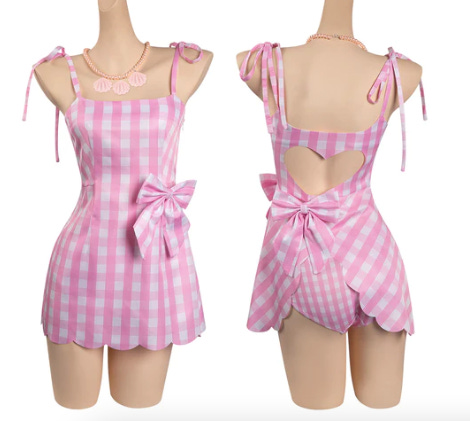
There’s a scene in the movie where Barbie sees a billboard of beauty pageant contestants and thinks it’s a picture of the Supreme Court. There’s a reason people laughed. Beauty queens in bikinis are not respectable enough for real work. Looking hyper-feminine, or campy, or overtly sexual is not respectable—-that’s the message I get from society. (To be clear, fuck the Supreme Court, even if they let the justices wear booty shorts and crop tops.)
I suppose one could argue that Margot Robbie could get hired without ridicule in her Barbie outfits, but that’s in spite of her clothes and makeup, not because of them—Robbie is a mega-rich, thin white woman, and she can pass as classy even in clothes you might find at the store in the mall that everyone says is for strippers. For those of us who don’t exist in one or many of those categories, when we play with hyper-femininity, we are not granted the same access….And we still do it anyway. Why? Because some of us are queer femmes who feel intense gender discomfort when we aren’t performing some level of hyper-femininity. Because others grew up going to Black beauty parlors with their moms, and femme ritual is part of the fabric of their family bonds. Because some of us are sex workers who get to dress how we want for work, and couldn’t get jobs doing so otherwise. And so on.
In a wonderful conversation, critical femininity scholar Hanna McCann and It’s Been a Minute host Brittany Luse talk about the Bimbo phenomenon, Barbie, and femmeness more generally. McCann echoes my exact sentiments here: “the hyperfemininity of Barbie is actually… in her unnaturalness; [it] points out something about the unnaturalness of gender generally. Like, it actually seems kind of subversive and queer to me rather than natural and unremarked upon.” Barbie has been marketed to be respectful, the Bimbo has not, but people are making what they want of the resurgence of Barbie’s gender.
“There's a kind of, like, feminist critique of Barbie as representing patriarchal femininity. And then there's a feminist defense of Barbie as representing a girlboss feminism. I hate both of those, really,” says McCann. “I think that if we want to look at what Barbie means, she's not just this floating signifier that tells us how to look. It's about how people play with Barbie.”
For McCann, it’s not surprising that modern-day Bimbos are connecting with Barbie, and taking her aesthetic to the realms of what McCann describes as intrinsically connected to “[an] aesthetic that is associated with kind of working class or lower class and often, like, white-trash stereotype.” (If I may, this is also the main crux of my memoir.)
*(It is worth naming that Barbie was modeled after a German toy often given as a gag gift to adult men; Bild Lilli was initially a comic strip that featured a sex worker. Everytime I hear this mentioned in a podcast or interview, it’s followed by something like, “So you can see how this complicates any idea that Barbie has feminist origins!” First, what an annoying SWERF-reflex thing to say; second, Lilli in the comic was known almost entirely for the way she stood up to men who harassed her on the street. I would rather have a babe with a rack so big she would fall over if she were a human who is known for her ability to defend herself from bullshit men as she hustled in the underground economy, than a human-proportion Barbie in a suit who is the CEO of a corporation. Just saying!)
To reiterate, I genuinely agree with DeFino who reminds us of the harm of mass consumerism and the horrors of production processes. We should be interrogating that in every realm of life (food! transportation! housing!). But it is deeply misguided to suggest that the ‘doll-like look’ is a hegemonic beauty norm that rewards those who play with it. And many of us find ways to perform femininity without a lot of consumption (I am not necessarily one of them; I don’t really buy much makeup, but I do spend money on nails and lashes, as I’ve written about before). To me, Barbie’s over-the-top aesthetic—and her sex worker origins— is one of the most redeeming things about her.
Barbie & the Binary (or, A Queer & Trans Reading of Barbie)
On the surface, the Barbie movie is entirely binary. There are only Kens and Barbies. (Well, and an Allan, which I’ll get to in a moment.) We frequently see lighting in pink and blue. America Ferrera’s now well circulated speech about how hard it is to be a woman reiterates a potentially essentialist narrative. It is absolutely important to name the ways in which this movie perpetuates binary gender.
But! There is a read of this film that is so queer and so trans that I would actually be extremely surprised if Gerwig didn’t intend it. There are multiple lines in the film that highlight the fact that Barbies and Kens do not have genitals. Robbie says so explicitly to a group of construction workers, Weird Barbie (played brilliantly by Kate McKinnon) has a lusty line about wanting to see the amorphous blob under Ken’s pants, and one scene between Barbie and Ken innuendos that there is no way for them to have any kind of sex. Toward the end of the film, Barbie has a realization that she can just be human, even if she was assigned “doll” at birth. And the final scene of the movie? Barbie, a fully grown person, sees a gynecologist for the first time. (Here’s a trans subreddit with comments full of transfolks discussing the film as a trans allegory.) Regardless of genitals or lack thereof, we have very clear portrayals of masculine dolls and feminine dolls. What a fantastic showcase of gender performativity! Barbie says: what is in your pants has no bearing on how you do your gender.
Oh, and back to Allan (Michael Cera, who was clearly made for this role). Allan is Ken’s pal (“He fits in all of Ken’s clothes!” said the tagline on his short-lived box), and Allan is really not into any of the Kens’ masculine activities. When the Barbies revolt against the new patriarchal rule in Barbieland/Kendom, Allan joins their team (in pink), not the Kens. In an article for them, Michael Cuby decodes Allan as gay; but we could just as easily read Allan as trans, or at least an egg, as another trans friend said.
Additionally, Doctor Barbie is played by Hari Neff, a trans actress. I actually think this is barely worth mentioning since Neff is a woman and that doesn’t actually trouble the binary, but we are living in a world where hiring trans actors is still extremely rare, and it’s even rarer that they are cast to play anything other than a character whose arc is about being trans. So, with all the usual caveats that trans representation does not at all equate to trans liberation, it was still cool to know that a trans actress got a paycheck for this.
All this said, I was actually hoping the film would be gayer. There are a couple moments when we feel some homoerotic tension with the Kens (most notably, when the boys stand around hotly-threatening to “beach” each other off), but that’s, like, it. The Barbie’s aren’t interested in the Kens, but they also aren’t interested in each other. (The closest we get to Barbie being a lesbian is the running gag that she’s an Indigo Girls fan.) It’s totally cool if, as some have theorized, Barbies are asexual, but I was hoping for a little more explicitly gay camp. I also know I’m not alone in having used Barbies in my childhood as a tool for sexual exploration— it would’ve been nice to get a little nod to some plastic scissoring. But —and this is one of the more film-specific critiques I have of the movie — I also think they were struggling to figure out the target audience and what is and isn’t “age appropriate.”
Barbie as an Extra-Textual Cultural Phenomenon of Play & Cohesion
I do not, with any habit, watch sporting events. I like probably just shy of a dozen Taylor Swift songs and certainly would never consider spending a month of rent on a ticket to see her tour. I spent a lot of my formative years thriving on the fact that I was into stuff that the ~mainstream~ was not into. I am—at last! —ready, willing, and eagerly open to finally indulging the glorious energy of mass cultural buy-in. I have not purchased a single Barbie™ item other than the two tickets (a total of $15), but I have been LOVING the memes, the pictures everyone is posting on Instagram, overheard conversations about the movie at the coffee shop! Give me a pop culture phenomenon that everyone knows about! A capitalist product will not fight alienation but the meaning-making we, as humans, do with art is the stuff of a good life! Grownups remembering what it is like to play, to be silly, to have fun— these things reset our overworked, stressed, tired, depressed little nervous systems! Give me pink, give me dance ballets, give me inside jokes that practically everyone will get! Connection! Put it in my veins!
(On the note of connection, there is a really adorable tender thing that queer femmes share — when we greet each other (on text or email or in person) we say: “Hi femme.” (Some butches greet us this way too <3). It’s a form of in-group interpellation that never fails to make my heart a little glowy. The chorus of “Hi Barbie” all around me feels similar, and I am just relishing in it!)
Barbie & Oppenheimer
Barbie is a better movie. Oppenheimer romanticizes the seemingly barely-there ethical dilemma faced by the creator of the bomb, and focuses primarily on a boring McCarthy-era interrogation of his politics (which aren’t even particularly radical!). The women in the movie are what I’m calling “brainy pixie dream girls” — marked as smart (and also, unlike Oppie, actually communists), but still there solely to drive the plot and character development of the male lead. Not one Japanese actor was paid in a movie about a mass death event in their country. Christopher Nolan manspreads the cut for a full three hours. They somehow make dreamboat Cillian Murphy look kinda bad. Read Michelle Tea’s hilarious review here, and Ryu Spaeth’s important piece, “Who are the Japanese in Oppenheimer?”.
***
As you can see, I am overwhelmingly in the pro-Barbie camp. The general politics kinda suck, the conversation it inspires about more expansive versions of feminism are interesting and worth exploring, and the buzz surrounding it is just a real delight. (Also, the set and costumes were amazing. And the dance numbers. And the most tender B plot about existential dread and the worth-it-ness of the emotional rollercoaster of the human experience!) I would love to know what you think, too.
Thanks for reading, Barbies! <3



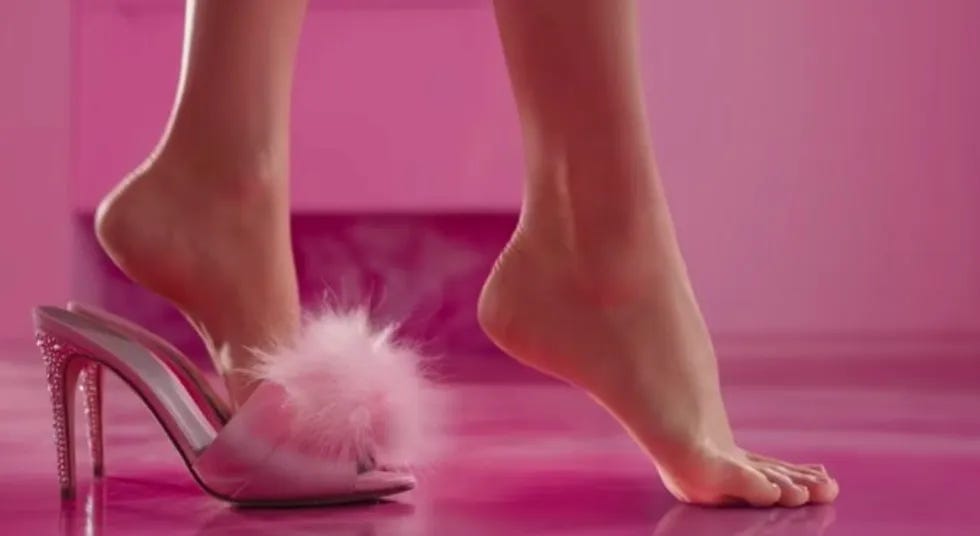
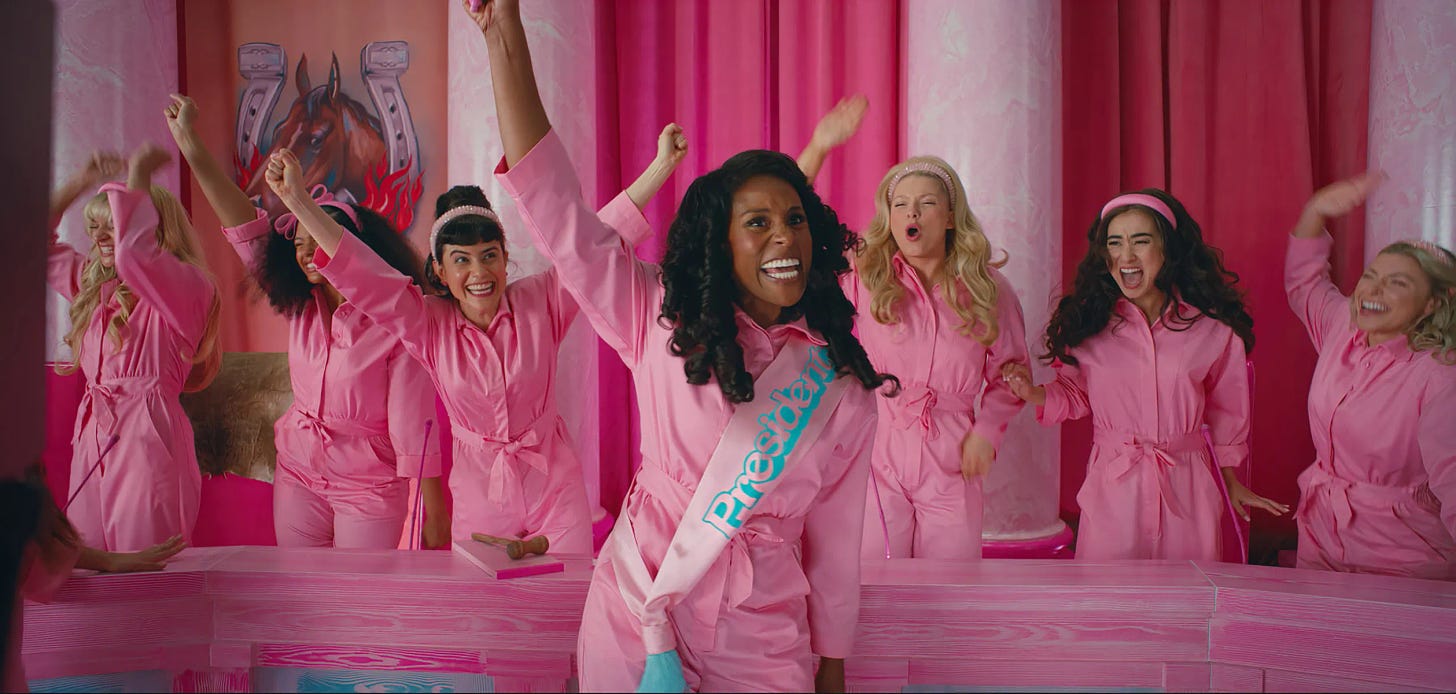
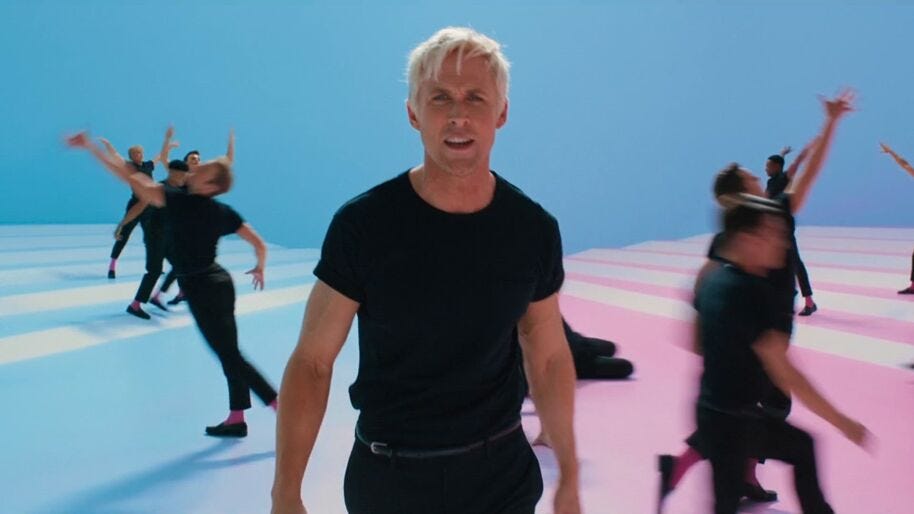
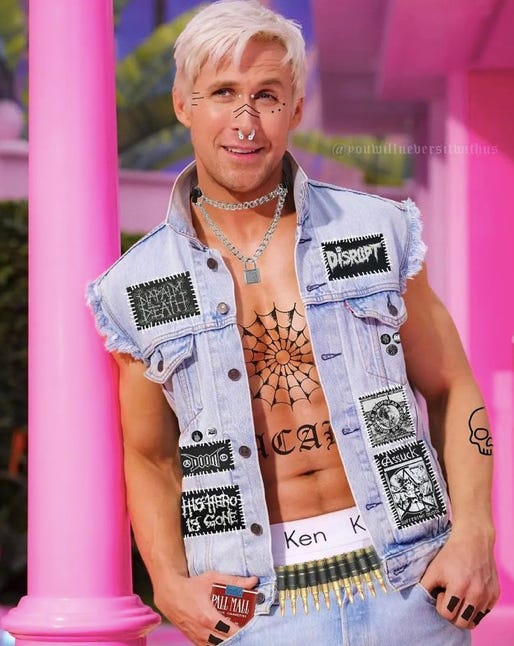

“ I would rather have a babe with a rack so big she would fall over if she were a human who is known for her ability to defend herself from bullshit men as she hustled in the underground economy, than a human-proportion Barbie in a suit who is the CEO of a corporation.” 💗💕👏🏼👏🏼👏🏼
LOVE this so much!!! I’m so confused all the time by the notion that hyper-femininity is rewarded... I have not lived in that world!
Also! Think you would have fun with the role Jenna Lyons is playing on Real Housewives of New York... First queer housewife, I think, and speaks about dressing for men versus not.